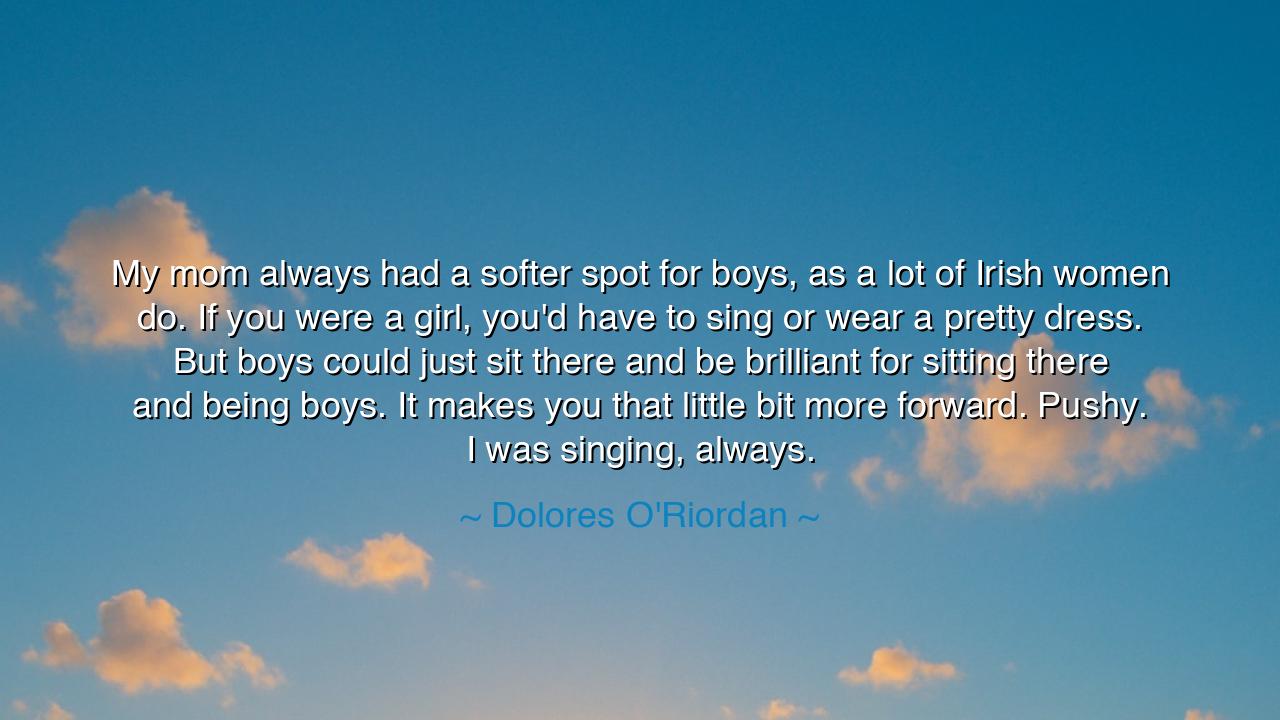
My mom always had a softer spot for boys, as a lot of Irish women
My mom always had a softer spot for boys, as a lot of Irish women do. If you were a girl, you'd have to sing or wear a pretty dress. But boys could just sit there and be brilliant for sitting there and being boys. It makes you that little bit more forward. Pushy. I was singing, always.






Dolores O’Riordan, the voice of a generation and the soul of a nation, once reflected on her upbringing with these words: “My mom always had a softer spot for boys, as a lot of Irish women do. If you were a girl, you’d have to sing or wear a pretty dress. But boys could just sit there and be brilliant for sitting there and being boys. It makes you that little bit more forward. Pushy. I was singing, always.” In this confession lies both the sting of inequality and the flame of resilience, the sorrow of being undervalued and the triumph of turning that burden into a gift.
At its core, this reflection speaks of the quiet injustices that shape childhood. In many homes, especially in older times, boys were celebrated for their mere existence, while girls were asked to perform, to please, to prove their worth through beauty, obedience, or talent. Dolores, sharp of spirit, felt this truth in her own family, where her mother, like many women of her generation, unknowingly passed on the traditions of preference for sons. Yet rather than silence her, this pressure ignited her determination—to sing, to be heard, to rise.
This is no new story. Across history, women have had to labor not only against poverty or circumstance but against the weight of cultural expectation. Consider the life of Hildegard of Bingen, the medieval mystic and composer. In an age when women were often voiceless, she claimed her place through visions, writings, and music, pushing past restrictions to be remembered for centuries. Like Dolores, she was told to prove her worth, and like Dolores, she answered with song. Both women turned limitation into legacy.
Dolores’s words also reveal the paradox of inequality: it can wound, but it can also forge strength. To be told one must earn what others are given freely is unjust, yet it teaches endurance, creativity, and audacity. She admits it made her more “forward, pushy”—qualities often condemned in women, but essential to anyone who wishes to change the world. And change the world she did, with her singing, a voice that rose from the margins to echo in stadiums across the earth. What began as a girl’s survival became an anthem of defiance.
The deeper meaning of her reflection lies in the recognition that art is often born from struggle. If life had praised her merely for existing, perhaps her drive would not have burned so fiercely. But because she was made to prove herself, she became relentless, her voice sharpened into something that could not be ignored. This is the way of many great artists: they are formed in the fires of contradiction, their gifts honed by the very pressures that sought to silence them.
The lesson for us is twofold: first, to see and challenge the injustices that remain, so that daughters are no longer told they must do more simply to be valued equally. And second, to recognize that when burdens fall upon us, we can choose to turn them into power. Dolores’s story is both a warning against prejudice and a hymn to perseverance. Her mother’s favoritism for the boys shaped her path, but it did not end it—instead, it pushed her to sing louder, clearer, stronger.
Practically, this means encouraging all children equally—sons and daughters alike—not for fulfilling a role, but for becoming who they truly are. And for those who feel overlooked, it means remembering Dolores’s example: let neglect become your fuel, let doubt become your reason to rise, let your voice be your answer to silence.
Thus, Dolores O’Riordan’s words ring across generations: she was singing, always, not because life made it easy, but because life made it necessary. And in that necessity, she discovered her power. May we, too, learn to turn every slight into strength, every silence into song, until the world can no longer ignore the voices it once tried to quiet.






AAdministratorAdministrator
Welcome, honored guests. Please leave a comment, we will respond soon